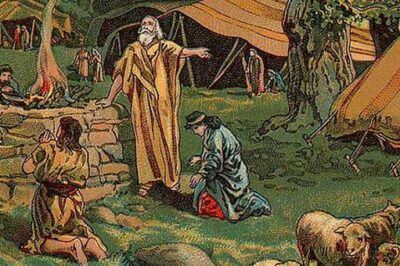Replacement theology hangs its hat on one verse primarily in order to say that all of God’s promises to Abraham’s seed were to one person only—the Messiah.
“The promises were spoken to Abraham and to his seed. Scripture does not say ‘and to seeds,’ meaning many people, but ‘and to your seed,’ meaning one person, who is Messiah” (Gal. 3:16, NIV).
This is part of a series we are doing exposing the problems in fulfillment theology as was taught specifically by Dr. Gary Burge in February 2014 at the “Christ at the Checkpoint” conference in Bethlehem.
Burge and other adherents of fulfillment theology argue that the promise was never to Abraham’s descendants but to Yeshua alone. In Him, they say, all the promises of Abraham are fulfilled.
Israel’s Calling—One Big Joke?
Does not such a theory make the entire calling of Israel, 400 years of slavery, the Temple, the sacrifices, the exiles and the judgments one big joke?
They base this primarily on this one verse in Galatians while ignoring others that clearly contradict their interpretation. Again, I refer to Dan Juster’s statement in rebuttal to Dr. Burge, regarding the need of the Old Covenant to understand the New. Dr. Burge takes Galatians 3:16 as if it is floating alone on its own, without any connection to the rest of the Bible. This is a dangerous exegesis—form of interpretation. Galatians must not only be seen in light of the Old Covenant, but in light of Paul’s promises to Israel in Romans, written several years later!
Is vs. Was
Clearly, Paul was not referring to seed as singular in every aspect, as he affirms the calling on ethnic Israel even in unbelief (Rom. 3:1-4, Rom. 11:29). In Romans 9, where Paul intercedes for Israel—to the point of being willing to trade his salvation for theirs—he says:
“Theirs is the adoption to sonship; theirs the divine glory, the covenants, the receiving of the law, the temple worship and the promises. Theirs are the patriarchs, and from them is traced the human ancestry of the Messiah, who is God over all, forever praised!” (vv. 4-5, emphasis added).
In all these statements, as Dan Juster pointed out, Paul uses the present tense “is” and “are” as opposed to “was” and “were.”
Paul Continues to Be an Israelite
And look what the apostle says in Romans 11:
“I say then, has God cast away His people (Israel)? Certainly not! For I also am an Israelite, of the seed of Abraham, of the tribe of Benjamin (v. 1, emphasis added).
Paul emphasizes his continued life as a Jew based on being part of the natural seed of Abraham. It cannot be argued here that Paul is referring to the spiritual seed of Abraham or Abraham’s children by faith. The context is clearly natural Israel. He uses his natural heritage to make the claim that God has not repudiated his people and that God has a future plan of salvation for Israel.
But Paul is not saying something new in Romans 11. He is affirming the promises of Abraham and Moses, because already in the middle of the first century, hardly two decades after the Resurrection, Gentile believers were already dismissing the nation of Israel. Paul speaks to Dr. Burge and others prophetically in Romans 11, warning them not to turn against Israel. (See verses 17-24.)
Stars of the Sky
In order to embrace Burge’s view of Galatians 3:16, we must rejected large portions of the Bible.
“[God] took [Abram] outside and said, ‘Look up at the sky and count the stars—if indeed you can count them.’ Then he said to him, ‘So shall your offspring be.’” (Gen. 15:5) (The Hebrew word for offspring, zerah, is the same Hebrew word that Paul was referring to when he writes seed.)
And to be clear, the word seed in Hebrew, zerah, when referring to offspring, is singular and plural in the Hebrew, just as deer or fish in English. It makes absolutely no sense to assume that Paul is intending to say that seed is singular when it refers to the stars of the sky.
Then there is Genesis 22:17: “I will surely bless you and make your descendants [zerah] as numerous as the stars in the sky and as the sand on the seashore.” One may say that it is not referring to Jews, but future believers—Abraham’s spiritual children. Read the next verse: “through your offspring [zerah] all nations on earth will be blessed.”
Let me make that clearer. Burge says that Abraham’s natural seed was referring to one person only—the Messiah. How can one person be described as the sands of the seashore or the stars of the sky? It’s not logical.
So, if we can easily conclude that the promise to Abraham was to his physical descendants, plural, what in the world was Paul doing in Gal. 3:16? We will answer that in the next blog.
Ron Cantor is the director of Messiah’s Mandate International in Israel, a Messianic ministry dedicated to taking the message of Jesus from Israel to the ends of the earth (Acts 1:8). Cantor also travels internationally teaching on the Jewish roots of the New Testament. He serves on the pastoral team of Tiferet Yeshua, a Hebrew-speaking congregation in Tel Aviv. His newest book is Identity Theft. Follow him at @RonSCantor on Twitter.
For the original article, visit messiahsmandate.org.








Leave a Comment
You must be logged in to post a comment.